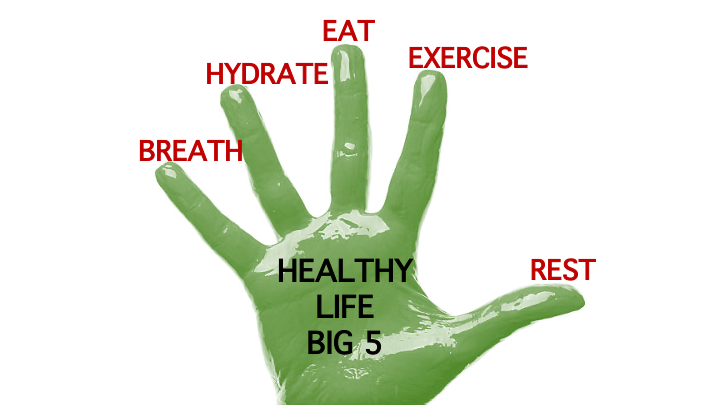This Big 5 has nothing to do with a safari. But it has to do with a journey we took at my employer, Valid. We organised a Vitality week. The theme of the week was health, mental and physical. The program was based on mini-lectures and workshop many of which prepared by students in HR and psychology from the Fontys university for applied sciences. The topics: how to adopt new and shed poor habits, why physical activity is important, embracing stress, healthy food, feeling secure in the workplace and the importance of cooperation. A critical aspect of vitality is of course being active socially.
A serendipitous event: a week or so prior to Valid’s Vitality week I had the pleasure to follow a lecture by Ekaterina Griga. Ekaterina is among other things a therapist and teacher in “Healing Food”. She discussed the Big 5 of healthy living. The bottom-line is: being healthy is a holistic endeavour. These Big 5 summarise what can do to remain vital: Breath, Hydrate, Eat, Exercise, Rest. These Big 5 resonated in my mind during the whole Valid’s Vitality week.
Below follow some tips based on each of the Big 5.
Breath!
Obviously the biggest of the 5 is ensuring that you keep breathing! In our modern life we are surrounded by a lot of stressors: all sorts of alerts from our smartphones – instant messages, social media messages, e-mails, breaking news… – loud urban noises, a never-ending list of things to do, etc.
Stress and breathing are very strongly interconnected. As your brain sends stress signals to your body, your heart starts pounding and your breathing becomes more superficial. This in turns triggers the production of hormones that prepare your body for a flight of fight situation. We are not usually involved in life-threatening situations, so stress-induced shallow breathing takes energy away from more important processes like digesting.
An interesting concept in relation to breathing is cardiac coherence: you can control your heart rate variability by controlling your breathing. Here is a simple article about this: “What is Heart Coherence, and Why is it so Powerful?”. This piece contains more scientific explanations: “Cardiac coherence, self-regulation, autonomic stability, and psychosocial well-being”.
Hydrate your Body
What your body mostly need next to oxygen is water. Hence, make sure you drink enough of it! As your body needs to remain PH-neutral (see the topic acidic-alkaline balance under “Eat”), stick to water, fresh herb infusions and smoothies of fruit or vegetables. Basically, everything else is acidic. Do not worry too much about how much you drink. Drink when you are thirsty … or feel hungry! I learned that a light hunger feeling in fact is a cry for water. You are truly hungry when your stomach rumbles.
Eat Healthily
Most of my blogs are about this topic. Suffice to say here that the essence of healthy eating is about balancing the alkalinity in your food: you body needs 80% alkaline (veggies and fruit) and 20% acidic (protein-rich) foods. The older you get the more important it is to respect this basic (pun intended) premise. See here for more information on this topic. As we explained during Valid’s vitality week, one can combine eating AND drinking healthily thanks to smoothies: there is a lot of water in fruit and vegetables so don’t hesitate to make a smoothie to get enough greens.
Exercise Brain and Heart
This is straightforward: as a species we are made to move. Our whole body needs exercise to stay in shape. Ideally, you should be active for 30 minutes every day. Walking is particularly recommended. Split those 30 minutes in 3 times 10-15 minutes if that suits you better, early in the morning, at lunch and after dinner for instance. During Valid’s week we introduced the “Ommetjes” (take a stroll) app which added a competitive incentive. Any kind of nudge helps adopting a new behaviour. That’s why we also introduced BJ Fogg’s Tiny Habits concept during Valid’s vitality week.
Rest – At Least Sleep
When we rest, sleep at least, our body resets itself. Rest is vital for better mental health, increased concentration and memory, a healthier immune system, reduced stress, improved mood and even a better metabolism. Intermittent fasting is one of the ways to give your body a rest. Here’s a nice article about “The Benefits Of Resting And How To Unplug In A Busy World”. Here’s a good article – especially for students – about “The importance of rest for academic success” which explains the difference kinds of rest that you need. Do at least one thing every day to remain healthy: leave your smartphone or computer alone one hour before going to bed and get enough sleep.
Remain healthy? As easy as one through five.
